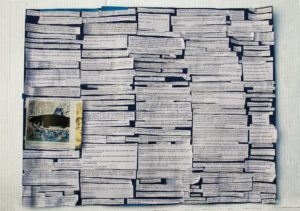I first learned about Jenny Offill’s novel Weather through an interesting entry on Justin’s weeknotes, which referred to Offill’s writing process, “covering poster boards with pasted fragments of her work in-progress“. This was followed by a stunning New York Times interview.
Weather is a short novel composed of fragments. The writing is incredibly careful, and the meaning is incredibly dense. Each word carries a great weight – this is a book that should be read slowly. The plot, according to the NYT’s description, “does not build so much as flurry“. The main character Lizzie’s domestic life is played against the concerns and terrors of climate change; which is an underwhelming description of such a funny and exciting novel.
Amitav Ghosh has argued that we need to find new forms of literature capable of dealing with climate change, and Offill does a good job of evoking climate change as what Timothy Morton referred to as a ‘hyperobject.’ The danger of such novels is that they can do little more than depress the reader with the fate lying in store for the world (although Offill places a URL at the end of the text, www.obligatorynoteofhope.com/). Apparently, Offill’s first ideas for the novel were “as a survival manual for her daughter, cramming it with information about every possible catastrophe, with tear-out sheets on practical tips. Some of these remain” (NYT)
The big attraction of the book for me was the form. I love novels with notes and references at the back, novels which blur the lines between fiction and non-fiction. I love texts made of fragments and bought the hardback because I wanted to engage with the physicality of the text, rather read it on my kindle where the layout is more mutable. As media loses heft in the world, text as a physical object becomes even more important and compelling (and the novel is aware of this through Lizzie’s interactions with websites, minecraft and podcasts).
Some more quotes from the New York Times Interview:
The fragment is an old form, perhaps even our native form — don’t we speak to ourselves in curt directives, experience memory as clusters of language? In Offill’s hands, however, the form becomes something new, not a way of communicating estrangement or the scroll of a social media feed but a method of distilling experience into its brightest, most blazing forms — atoms of intense feeling.
And another, on Offill’s process, and how important physical text is for her work:
The key to her process, she told me, is time — hence the agonizing slowness of the writing. Only by waiting and continuing to stare at and sift these fragments does it become clear which ought to remain. So many, she said, lose their “radiance”; they reveal themselves to be merely clever.

This Article was mentioned on orbific.com